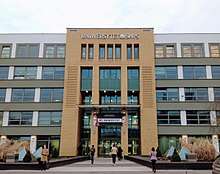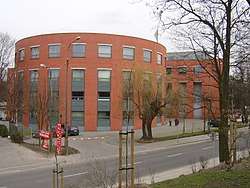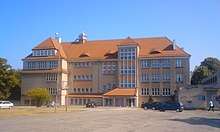SWPS University of Social Sciences and Humanities
SWPS University of Social Sciences and Humanities or simply SWPS University (Polish: SWPS Uniwersytet Humanistycznospołeczny) is a private non-profit university in Poland established in 1996 by three professors of Psychology, Andrzej Eliasz, Zbigniew Pietrasiński and Janusz Reykowski.
Polish: SWPS Uniwersytet Humanistycznospołeczny | |
 | |
Former names | Szkoła Wyższa Psychologii Społecznej |
|---|---|
| Type | Private |
| Established | 1996 |
| Founder | Piotr Voelkel, Andrzej Eliasz, Zbigniew Pietrasiński and Janusz Reykowski |
| Rector | Associate Professor Roman Cieślak, Ph.D. |
Administrative staff | 1000 |
| Students | 16,500[1] |
| Location | , |
| Campus | Urban |
| Affiliations | EUA, Socrates-Erasmus |
| Website | swps.pl |
SWPS University is one of the largest private universities in Poland with a community of over 14,000 students at undergraduate, postgraduate and doctoral levels, including over 1,200 international students from more than 60 countries. The university has five campuses, located in major Polish cities, including Warsaw, Wrocław, Sopot, Poznań, and Katowice.[2]
The institution was formerly known as the Warsaw School of Social Psychology (Szkoła Wyższa Psychologii Społecznej, SWPS). It was granted university status under Polish law in 2015.[3]
Administration
In 2008, the position of SWPS University Founder was transferred to the Institute for the Development of Education (Instytut Rozwoju Edukacji) and its President, Piotr Voelkel, who is a Polish businessman and philanthropist Piotr Voelkel.[4] Before 2018, SWPS University was administered by a privately appointed board of trustees. Trustees served four-year terms and met annually. Chairman of the Board of Trustees was Andrzej Eliasz. Other members included Jan Strelau (Former Chairman of the Board of Trustees), Michał Jan Boni (Member of the European Parliament), Magdalena Dziewguć (Google for Work), Robert Firmhofer (Director of Copernicus Science Centre), Aleksander Kutela (Onet.pl S.A.), Przemysław Schmidt, Ewa Voelkel-Krokowicz.[5] After 2018, in compliance with the new higher education law in Poland, the governing body of SWPS University consists of Rector and Director General.
Rectors
- Andrzej Eliasz (from 1996 to 2016)
- Roman Cieślak (since 2016)[6]
Academics

SWPS University offers 15 undergraduate and graduate programs taught entirely in English and over 30 undergraduate, graduate, and doctoral study programs, with over 70 specializations, in Polish. The main study areas are Psychology, Law, Languages, Literature and Culture Studies, Media and Communication, Management, and Design. [7] The University has been ranked by the Ministry of Science and Higher Education as the leading higher education institution offering Social Sciences program in Poland.
Faculties
Seven faculties of SWPS University have the authority to grant doctoral degrees in the following disciplines: cultural studies, literature studies, law, and sociology (in Warsaw) as well as psychology (in Warsaw, Wrocław, and Sopot). The university also has the authority to grant post-doctoral degrees (habilitacja) in cultural studies (Warsaw) and psychology (Warsaw and Wrocław).
- Warsaw Faculty of Psychology
- Warsaw Faculty of Arts and Social Sciences
- Warsaw Faculty of Law
- Sopot Faculty of Psychology
- Katowice Faculty of Psychology
- Wrocław Faculty of Psychology
- Wrocław Faculty of Law and Communication
- Poznań Faculty of Social Sciences and Design


Notable staff
- Jan Strelau, doctor honoris causa[8]
- Shevah Weiss, doctor honoris causa[9]
- Robert Cialdini, doctor honoris causa[10]
- Philip Zimbardo, doctor honoris causa[11]
- Helmut Skowronek, doctor honoris causa[12]
- Małgorzata Kossut, head of the Department of Psychophysiology of Cognitive Processes
- Jerzy Adam Kowalski, Institute of Culture Science
- Tomasz Witkowski, founder of the Klub Sceptyków Polskich
- Roman Laskowski, professor of the Jagiellonian University and University of Gothenburg
- Piotr Waglowski, researcher of communication processes in the paradigm of social constructionism
- Andrzej Nowak, director and founder of the Institut of Social Psychology of Internet and Communication
- Jerzy Szacki, one of the most prominent representatives of the Warsaw School of the History of Ideas
- Dariusz Doliński, president of the Psychological Sciences Committee in the Polish Science Academy
- Bogdan Wojciszke
- Jerzy Bralczyk
- Klaus Bachmann, associate professor at the Institute of Political Science.
Notable alumni[13]
- Wojciech Kulesza, psychologist, SWPS University
- Michał Kosiński, psychologist, Stanford University
- Łukasz Gawęda, psychologist, Polish Academy of Sciences
- Mateusz Gola, psychologist, Polish Academy of Sciences and University of California, San Diego
- Aleksandra Cisłak-Wójcik, psychologist, SWPS University
- Żanna Słoniowska, novelist and journalist
- Matthew Grzesiak, psychologist
- Tomasz Kamusella, historian
- Ania, singer
- Aleksandra Szwed, actress
- Katarzyna Cichopek, actress
- Agnieszka Brustman, chess master
- Kaja Dobrzańska, art director and designer
- Mateusz Szmidt, art director
- Mateusz Antczak, communication & graphic designer
- Marek Kacprzak, journalist
- Róża Janusz, designer, founder of biodegradable packaging
- Agata Kiedrowicz, design writer and curator
- Agata Klimkowska, designer, co-founder of Fenek Studio
- Antonina Kiliś, designer, co-founder of Fenek Studio
Social engagement
SWPS University is collaborating with various local and national organisations nurturing the idea of social engagement of its faculty and students. SWPS has a Legal Clinic which offers free legal advice for low-income individuals. The University supports also local craftsmen running their small businesses in the Praga District of Warsaw where the University main campus is located. Much of the research output is devoted to social, business and political issues such as neuroscience, behavioral insights for economy and public policy, health and nutrition, ageing, youth adaptation, or facing EU challenges from Horizon Europe (e.g. migrations, human & technology relations in the digital world). SWPS cooperates with various NGOs and institutions devoted to social causes, are the first European campus with the Ashoka Journey to Changemaking Certificate, and are member of newly-established Engaged Universities Forum, grouping 7 Polish Universities around the UN SDGs.
Rankings
| University rankings | |
|---|---|
| Global – Overall | |
| THE World[14] | 1001+ |
SWPS University is ranked second best private higher education institution in Poland according to Perspektywy 2019 Polish University ranking.[15]
SWPS University is ranked 1001+ in the 2020 World University Rankings by Times Higher Education (THE) [16] [17] In the 2020 Times Higher Education World University Rankings by subject SWPS is ranked 401+ in Psychology [18] and 401-500 in Social Sciences. [19] In ARWU Global Ranking of Academic Subjects 2019 for Psychology SWPS University is ranked 201-300.[20]
See also
References
- History of SWPS University
- "University profile". www.studyinpoland.pl. Retrieved 2017-10-14.
- www.npc.pl, Net P.C. "SWPS Uniwersytet Humanistycznospołeczny - Ministerstwo Nauki i Szkolnictwa Wyższego". www.nauka.gov.pl (in Polish). Retrieved 2017-10-14.
- "Instytut Rozwoju Edukacji NIP 5213462069 KRS 0000291897 REGON 141190936 | krs-pobierz.pl". krs-pobierz.pl (in Polish). Retrieved 2018-06-07.
- Piasecka, Karolina. "Rada Powiernicza". www.swps.pl (in Polish). Retrieved 2018-06-07.
- PTWP. "Ustawa 2.0, rektor SWPS: Ustawa o szkolnictwie wyższym daje szanse aktywnym uczelniom - sejm-rząd Społeczeństwo". www.parlamentarny.pl (in Polish). Retrieved 2017-10-15.
- http://www.studia.swps.pl/english-site/
- Sławski, Rafał. "Profesor Jan Strelau doktorem honoris causa Uniwersytetu SWPS". www.swps.pl (in Polish). Retrieved 2017-10-15.
- Piasecka, Karolina. "Honorary Degrees and Recognition Committee". english.swps.pl. Retrieved 2017-10-15.
- Piasecka, Karolina. "Profesor Cialdini doktorem honoris causa SWPS". swps.pl (in Polish). Retrieved 2017-10-15.
- Pluta, Ewa. "Profesor Jan Strelau doktorem honoris causa Uniwersytetu SWPS". swps.pl (in Polish). Retrieved 2017-10-15.
- Piasecka, Karolina. "Honorary Degrees and Recognition Committee". english.swps.pl. Retrieved 2017-10-15.
- THE World University Ranking
- https://www.timeshighereducation.com/world-university-rankings/swps-university-social-sciences-and-humanities
- "Ranking Uczelni Niepublicznych - Ranking Szkół Wyższych PERSPEKTYWY 2019". www.perspektywy.pl (in Polish). Retrieved 2019-08-21.
- "SWPS University of Social Sciences and Humanities". Times Higher Education (THE). 2019-09-09. Retrieved 2020-01-02.
- "World University Rankings 2020". Times Higher Education (THE). Retrieved 2020-01-02.
- https://www.timeshighereducation.com/world-university-rankings/2020/subject-ranking/psychology#!/page/0/length/25/sort_by/rank/sort_order/asc/cols/stats
- https://www.timeshighereducation.com/world-university-rankings/2020/subject-ranking/social-sciences#!/page/0/length/25/sort_by/rank/sort_order/asc/cols/stats
- http://www.shanghairanking.com/Shanghairanking-Subject-Rankings/psychology.html
External links
| Wikimedia Commons has media related to SWPS University. |
